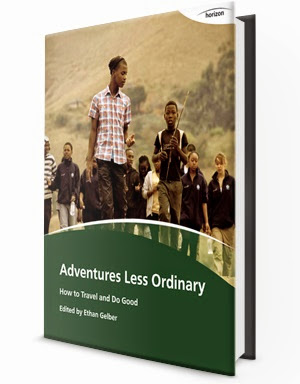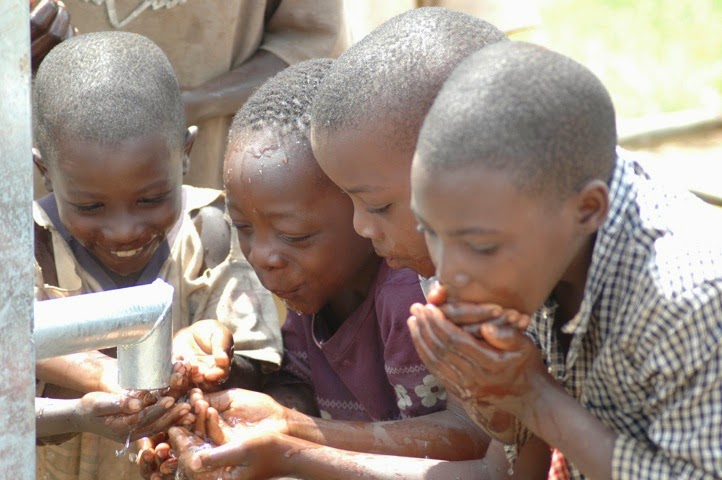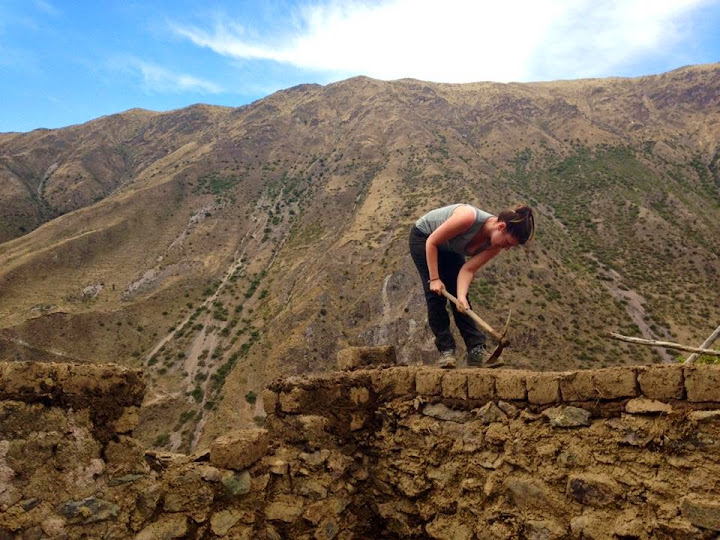Rarely do you come across a book that will change the world. Here is one.
Adventures Less Ordinary: How to Travel and Do Good is, hands down, the best book on travel I’ve ever read. "What? Why?" I hear you asking. Indeed, that statement is something I need to back up. This book is a revolutionary look at doing good as we travel. Far too often, we participate in or hear stories of volunteering, giving small tokens or money, or helping in ways that do not actually benefit the people involved (or worse, may cause harm). Whether you’re doing a service learning project, trying to help people when you travel, or are, like me, always wanting to help the world, even in small ways, this fact can strike home. When we give of ourselves, we want it to matter, to make a difference – not to make things worse.

With all the conflicting stories and news reports, HOW do we help? (It’s a given that we want to help – I truly think that is part of human nature.) How do we know that visiting elephants can be harmful or helpful? How do we know how to help people that need help? How can we learn best practices of helping? Compassion alone won’t change the world. We need to know HOW.
The answer? Knowledge.
This book offers, in part, a great deal of knowledge. This knowledge is hard-won, from experts around the world that work with volunteers in a variety of ways. In addition to this knowledge, the book offers a much to think about. Volunteering should not be a knee-jerk reaction to circumstances, although that is often the case. It should be considered, considerate, and have long-term, positive effects. We can blunder around and possibly help, or we can learn about the ways that people actually can use our help – and provide it to the best of our ability.
The book is split into two parts – What’s being done, and Good Intentions. It focuses on helping children, animals, communities, infrastructure, skills, and philanthropy. It discusses roles, cultural differences, expectations, questions to ask, and, perhaps most importantly, discusses the ways we need to change volunteering, to make bullied communities and disappointed volunteers things of the past. You’ll find first-hand stories from experts in their fields, checklists for inspiration, and a new way to think about and help the world.
One thing I love about this book (of many) is that it doesn’t claim to have all the answers. It does expand your worldview, and creates enormous avenues for discussion. I’m impressed.
AND: The book is, and always will be, FREE.
We had a chance to catch up with Ethan Gelber, editor of Adventures Less Ordinary: How to Travel and Do Good. He’s the founder of TheTravelWord and co-founder of Outbounding.org. In the late 1980s, he co-founded and co-directed a Paris-based bicycle tour operator and in the mid-1990s and he founded and presided over a non-profit focused on “educational internet adventures.” He specializes in responsible and sustainable travel practices, keeping things local, and quality and relevance in publishing and destination marketing.

Here’s what he had to say…
Please tell us about your new book, Adventures Less Ordinary: How to Travel and Do Good...
Adventures Less Ordinary is an anthology of analyses and suggestions from an ensemble of two dozen experienced experts who have been working for many years to improve the volunteer travel industry. The contributors explore the merits and perils of many established "voluntourism" activities and then provide practical advice to ethically-minded travelers about how to be sure of making a positive impact.
The book examines the state of the industry and explores the potential pitfalls of which travelers should be aware. It also outlines the kinds of questions they should ask before signing up to a program, as well as while in the field and once back at home. For example: How do you gauge the project’s impact within the host community? How do you ensure you have the necessary skills to make a difference? How do you measure your own personal impact?
What inspired this book?
The concept for the book emerged during the #MendNotEnd discussions on Outbounding.org. This involved various leading lights from across the volunteer travel space exploring ideas for the ongoing evolution and improvement of the "voluntourism" industry.
In parallel and at around the same time, Inspired Escapes had launched a business model in response to similar issues being addressed on Outbounding: What does meaningful travel philanthropy look like? How can Millennial-generation travelers engage with communities and good causes in a productive, respectful and sustainable way? Are there better alternatives to traditional approaches to for-profit voluntourism?
These respective quests obviously overlapped and we immediately recognized an opportunity to extend the #MendNotEnd discussions and communicate some of the themes and lessons to a wider audience. Inspired Escapes lent support to the project and Horizon Travel Press produced the guide. This made it possible to loop in contributions from the #MendNotEnd participants and many others.
I'm very impressed by the contributors to the book - can you share more about them and their chapters?
Over the course of many years in the travel industry - in particular in the responsible travel space - I have had the pleasure of meeting lots of very smart, highly motivated and inspiringly virtuous people: social entrepreneurs and conscientious business leaders committed to rallying travelers of all stripes to do the right thing. Unfortunately, and largely as a function of the way the world works, many (though hardly all) of these people often work in isolation or on discrete programs with limited overlap. Sometimes they are even in direct, but friendly, competition with one another.
So the fantastic exercise in which we had an opportunity to engage was to assemble this powerful divided brain trust into a whole of overlapping complementarity. One individual with a demonstrated passion for or experience with one particular area of identified interest within the volunteer travel space could bring his or her weight of wisdom to a collective of others who did the same. Sarah Brown, whose work in Cambodia and on a global level has drawn so much attention to the dangers of orphanage tourism could be understood side by side with that of Shannon O'Donnell, a writer and social-enterprise promoter, who brought perspective to the importance of community service, both at home and abroad. Outspoken communications activists like Jeremy Smith with demonstrated efforts in support of ethical animal-conservation practices could buttress equally important efforts to mobilize travel philanthropy and marshal it in careful and responsible ways like those overseen by Chris Mackay over the course of more than 15 years.
Then, in the mix of more directed analysis, we also included firsthand evidence of how individual actions, large and small, can make a difference; proof that the greatest obstacles to all of us making a difference are those that we ourselves place before us. These short contributions - we called them Eyewitness pieces - by leading voices serve as valuable connecting support.
More travelers than ever are interested in doing good as they go, whether it is volunteer travel/voluntourism, cultural exchange, etc. How can travelers learn not only about ethical volunteering practices, but how their actions influence the communities they visit?
As our e-book tries to make clear, this is a very complex issue, often oversimplified in the media. In fact, in early praise of our book, Stephen Wearing, Associate Professor at the University of Technology in Sydney, Australia (and also Co-editor of Journeys of Discovery In Volunteer Tourism: International Case Study Perspectives and Editor of the Journal of International Volunteer Tourism and Social Development), said that "This publication is a breath of fresh air at time when ill-informed journalists are providing very simplistic and shallow analysis of this growing sector."
So the first thing that travelers need to know is that although a desire to do good comes from a good place, the ways in which they sometimes act can be complicated by heady matters that don't point to good places. Hot on the heels of that tricky and somewhat dark thought, though, is a clarifying and illuminating reminder that there is a direct way to cut through the tangle: ask a ton of questions, insist on complete answers and, if in doubt, demand evidence as proof.
The challenge is to know what kinds of questions to ask and what constitutes a complete and verifiable reply. The questions should very specifically be about the impacts of actions and the motivations underpinning them. That is what our guide tries to provide: the door-opening lines of query that lead to truths… or the absence thereof. In addition, the contributors, their companies or programs, and other resources shared by them become valuable tools for defining what constitutes ethical volunteering practices and how they are beneficial to local communities.
A vital point about local communities, repeatedly emphasized in the guide: if you seek clear answers from them, then turn directly to them or to their deputized representatives. Don't assume that just because someone says he or she has a community's best interests at heart that that person has the trust of the community. My one regret about the guide is that we don't have enough community voice, which is a perpetual problem in the industry. If the goal of our magnanimity is to help improve the quality of life in local communities all across the globe, shouldn't we be hearing more from those local communities at every level of discourse about the issues that affect them? I hope we can all work together to repair this lack of communication.

Travel philanthropy is a loaded issue - a case of have/have nots, misguided intentions, etc. How can travelers be sure that their efforts (both time and money) go to the right place? How can people educate themselves on creating and participating in lasting social change (both at home and abroad)?
Another nettlesome topic, full of interwoven complexities. Let's start with this truism: a person who honestly wants to do good should never be told he or she is doing it for the wrong reasons. Honor should be given to any pure and unselfish desire to contribute positive energy to a world aswirl in negatives.
However, as I hope has become clear, how we go about getting from intention to action is where things get messy. The average traveler doesn't know how to identify real needs and then get money or services into the right hands in response. Complex bureaucracy designed to protect against shysterism has become as much of a stumbling block as the hucksters themselves.
The goal is to grasp for clarity. And transparency. Just as, in answer to the question above, the emphasis was placed on travelers themselves ensuring that their actions are appropriate, so too here do I think we all need to insist in the travelers' responsibilities. Blaming onerous systems for making it hard drive channel behavior is ignoring the responsibility one should take for one's own actions.
So how can travelers make sure that they're doing the right thing and through the right service that makes the greatest possible impact in the most meaningful ways? Research. Dialogue. Investigation. And holding true to the highest possible standards. For every possible action, there is an agency that can do it justice. But it may not be the easiest to find, especially since the most ethical agencies are often those with the smallest advertising budgets.

Beyond voluntourism: What is the future of volunteer travel? Will people avoid learning about these sensitive cultural and political issues, or will they dig deeper and press on?
I am unstinting in my belief that the same motivations guiding people to travel and do good will lead them through the swamps of how to do so. The future of volunteer travel is one that will be recognized for its value (without getting caught up in whether the term "voluntourism" is good or bad) but also be supported by a much more clear sense of how different desires and different levels of service lead to different results.
Some people need a lot of handholding when they travel and are willing to pay for it. Some people should let their financial or material clout carry more weight than their muscles can. Some people could do more in their own hometowns than in a remote village in a foreign land. There is nothing wrong with this, with different desires and expectations relying on different levels of engagement and service. But it does mean that the nature of people's travel experiences will not be the same. A person who chooses to support from afar or a high-comfort travelers simply won't go through a day the same way an adventurous and independent traveler would. As a result, the nature and degree of impact will be different.
Let's accept that and get on with things. And let's root out those who are guided by selfish motives and obfuscation.
Is there anything else you'd like to share?
We are launching this guide on Martin Luther King Jr Day of Service (in the United States). It is a day during which people engage in service that answers Dr. King's question, "What are you doing for others?"
With that in mind, remember that one of engines that propelled us to complete this guide was a desire to #MendNotEnd voluntourism and other forms of volunteer travel. Despite the complexities and the negative press, and counter to suggestions that more bad than good is being accomplished, moving forward should not be about suppressing benevolence and altruism, should not be about stifling the desire to help others. Instead it should be about identifying and discontinuing clearly detrimental efforts -- like those involving most orphanages or animal-petting programs -- and championing practices that have a demonstrable history of achieving beneficial ends for everyone involved.
This requires as much self-analysis and self-policing by the industry itself as it does an unrelenting push from outside to hold practitioners to high standards. That's why it is important for travelers themselves to play an active part in helping to improve what's already in place, driving it only to accept the best forward. And that is what our book is all about.
All photos courtesy and copyright Ethan Gelber and Inspired Escapes (volunteer photos)
